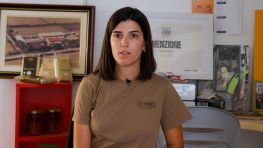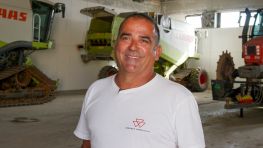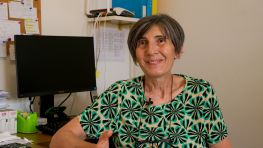 Rosalia Vacca and the Dream of…
Rosalia Vacca and the Dream of… Gualtiero Freiburger
The birth of a community of organic rice producers: The Biodistretto del Riso Piemontese.
Piedmontese by adoption but of Lombard origins, Gualtiero Freiburger has made much of his professional career within the Piedmont Region, at the Department of Agriculture, and in recent years he has had the role of manager of Agricultural Cultures before and of Rural and Organic Development then. In 2015, after the case of fake organic rice, exposed by the television program Report, he is concerned with rebuilding the credibility of the entire production chain, first of all by promoting the study of the techniques used in the field by those who really practice organic farming. in the paddy field.
Thus was born the Rio Bio System project that involves universities, rice bodies and public bodies, placing farmers at the center of the study, in a participatory research path. From this experience that has brought together producers and local actors, the project of the Biodistretto of Piedmontese organic rice was born, which has the Rovasenda area as its epicenter.
Freiburger also goes back to the historical reasons that led to the dispersion of part of the traditional pre-chemical peasant knowledge and therefore of that baggage of knowledge that today is part of good practices in organic farming. In particular, the fact that in Piedmont, for many, the farm represented the second job, weekend or evening work, has imposed a model of agriculture based on the management of ex post emergencies, in which chemistry has played an important role. fundamental role.
Video table of contents
- Born in Milan, agronomist in the Piedmont Region.
- Last five years organic agriculture and organic rice manager.
- The case of the fake organic rice raised by Report.
- The Riso Bio System project was born from the reaction of the Region and the Ministry.
- Riso Bio System: a participatory research, not lowered from above.
- Attention to biodiversity: the biological indicators of organic agriculture.
- How the Biodistretto of organic rice was born.
- Paolo Andrissi, president of the biodistrict.
- The biodistrict and local administrations.
- Dr. Rivella and the Malinvernian isoetes.
- The dream of extending the biodistrict to Lombardy to have more critical mass.
- Resistance of conventional rice growing: establishing a positive coexistence.
- The beginnings of organic farming: Crespi.
- The historical reasons in Piedmont for the development of conventional agriculture and the dispersion of traditional knowledge.
- The technique of crop rotation.
- Trade associations and the awareness that the change of direction is important.
- The absence of residues in the packaged rice and the absence of sample checks on the product.
- Nutraceutical properties of organic rice.
- Imported organic rice: imbalances for national rice cultivation. But organic remains a way to enhance Italian rice.
- Riso Bio System: an agreement that has created communities between Piedmontese and Lombard rice growers. The association of purpose.
- Lombard, great consumer of rice. Risotto and rice in soup.
- Risotto alla Milanese as a party dish.
Interview information
Country: IT
Region: Piemonte
City: Castelnuovo Don Bosco
Suburb: Mondonio
Gualtiero Freiburger
Date of birth: 05-31-1952
School: University
Profession: Pensioner
Languages: Italiano
Document by: Luca Ghiardo
Video by: Luca Ghiardo
Created: 27-05-2021
Questo video fa parte del seguente archivio
Rice stories
Rice stories
Food is a fundamental resource for man and his health, both through the supply of nutrients and the ability to embody traits of human culture that play a leading role in our well-being.
Over time, each territory has built original ways in which to relate to the fruits of its land, enriching them with rituals, symbolic meanings and culinary customs. Much of these relationships have been lost following the years of the economic boom, with the exodus from the countryside to urban centers, with the advent of agriculture for mass production and ultimately with the globalization of markets and the consequent impoverishment of the heritage of biodiversity and ethnodiversity.
The purpose of this archive is to collect evidence relating to the main rice production area in Europe, that is the Po Valley, and to investigate, through the analysis of textual sources and testimonies collected in the field, both what survives of this heritage, and the ways in which which has evolved and reached us, paying particular attention to the explicit and implicit links that bind food and health.






